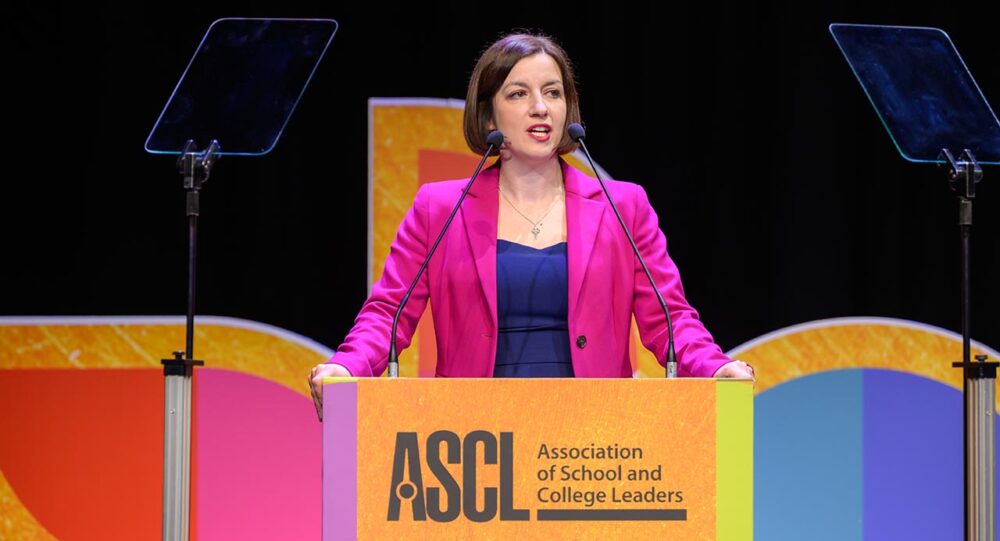The government’s new school-improvement squads will prioritise English and maths attainment, the quality of the reception year, attendance and inclusion, the education secretary has said.
Bridget Phillipson also told the ASCL leaders’ union conference that she expects all schools to keep phones out of the classroom, and that she has commissioned officials to examine “how we can more effectively monitor what’s happening on the ground”.
Leaders were also warned government will have to make more “difficult decisions” as “14 years of damage” across the sector “cannot be undone in simply eight months”.
She also stated: “There is proof that the inclusion versus standards compromise is no such thing.”
Here’s what you need to know…
1. The four priorities for RISE teams
The government’s new school improvement squads, known as RISE teams, launched last month. Among other things, they’ve been charged with brokering support for struggling schools.
They will also have a universal service for primaries and secondaries with minimal issues.
Phillipson revealed this morning this support will spread “best practice following four national priorities”.
One of these is “attainment with a focus on English and maths”. Another RISE team “priority” will be “reception-year quality”. The other two are attendance and inclusion.
“We will drive progress across the board, but especially for kids from tough backgrounds, and that progress must start early in life, when the possibilities still stretch out ahead.
“That’s why the [prime minister’s] plan for change also sets the milestone of a record number of children starting school ready to learn.”
2. Officials look for ways to monitor phone disruption
Phillipson revealed technology secretary Peter Kyle “has commissioned a study led by the University of Cambridge to assess the impact of social media and smartphones, strengthening the evidence base on their impact on children’s wellbeing”.
She added the devices “They have no place in our schools, and the government’s position is clear, you have our full backing in ridding our classrooms of the disruption of phones.
“And I know that will be the case in the overwhelming majority of your classrooms, but I expect it to be true in all classrooms. So I’ve tasked my officials to look at how we can more effectively monitor what’s happening on the ground.”
Officials have been tasked with examining “how we can more effectively monitor what’s happening on the ground”.
3. SEND best practice survey to launch
Tom Rees, CEO of Ormiston Academies Trust, was in November appointed chair of the government’s new expert advisory group on inclusion, which will oversee reforms aimed at making mainstream schools more inclusive.
Phillipson said he is working with researchers from ImpactED and “will launch a survey on best practice tomorrow”.
Dame Christine Lenehan, the government’s strategic adviser on SEND, is also “drawing on the wisdom of parents, professionals and leaders”.
Phillipson continued: “But this is a complex and difficult challenge. It will take time we need to get this right.”
4. ‘No inclusion vs standards compromise’
She also referenced a school in Sheffield with a 30-place integrated resource unit for autism, with SEND pupils spending “most of their time in mainstream lessons supported by specialist learning assistants”.
It “focuses not just on support but on outcomes too”, with attainment above local and national averages.
Pointing to this example, Phillipson said: “There is proof that the inclusion versus standards compromise is no such thing. They go together.”
5. Buckle up for more ‘difficult decisions’
During her speech, Phillipson stated chancellor Rachel Reeves “protected key education priorities at the budget, [including] £8bn for early years, a 5.5 percent pay award for schoolteachers”, despite “the toughest fiscal inheritance in a generation”.
But having made “some incredibly difficult decisions”, she stressed “more are coming”.
“I have to be blunt about our inheritance as a government, not just fiscally, but all the fabric of education too. You know this all too well.
“You see it every day, children turning up still in nappies, not able to speak, absences, stubbornly high, vacancies up, the SEND system creaking after years of neglect. The damage of 14 years cannot be undone in simply eight months.”
6. DfE looking at ‘options’ over overlapping complaints
Speaking to journalists after her speech, Phillipson revealed her department was “thinking about what more we can do to provide support for schools” around parental complaints, particularly “overlapping” complaints to multiple agencies.
She said it was “important” parents had avenues to air complaints, but that she was “increasingly concerned about the sheer volume of what school leaders are having to deal with”.
“We are looking carefully at what more we can do as government to ensure that parents’ complaints don’t weigh down too heavily on schools and school leaders.”
She added: “I think there’s a question about the nature and the way in which complaints are made, and the challenge that comes of parents complaining to multiple avenues at the same time. So that’s one area that we’re considering what the options might be like.”
7. No answer on whether getting an EHCP will get harder
The i Paper quoted a source stating the government’s direction of travel was “changing the threshold for EHCPs to make [them] harder to get”.
Asked if it would become harder to get an EHCP, Phillipson did not directly answer the question.
She said she understood “the anxiety that parents feel”.
She added she wanted to get to a system “with much earlier identification of need, much more timely intervention and support” with more specialist support in mainstream.
8. ‘No plans’ to change Oak and LocatED as other quangos cut
The government is reviewing its use of quangos, or quasi-autonomous non-governmental organisations, and announced this week it would scrap NHS England.
Asked if DfE quangos the Oak National Academy and LocatED property company were safe, Phillipson said: “We have no plans to make any changes there.”








Your thoughts